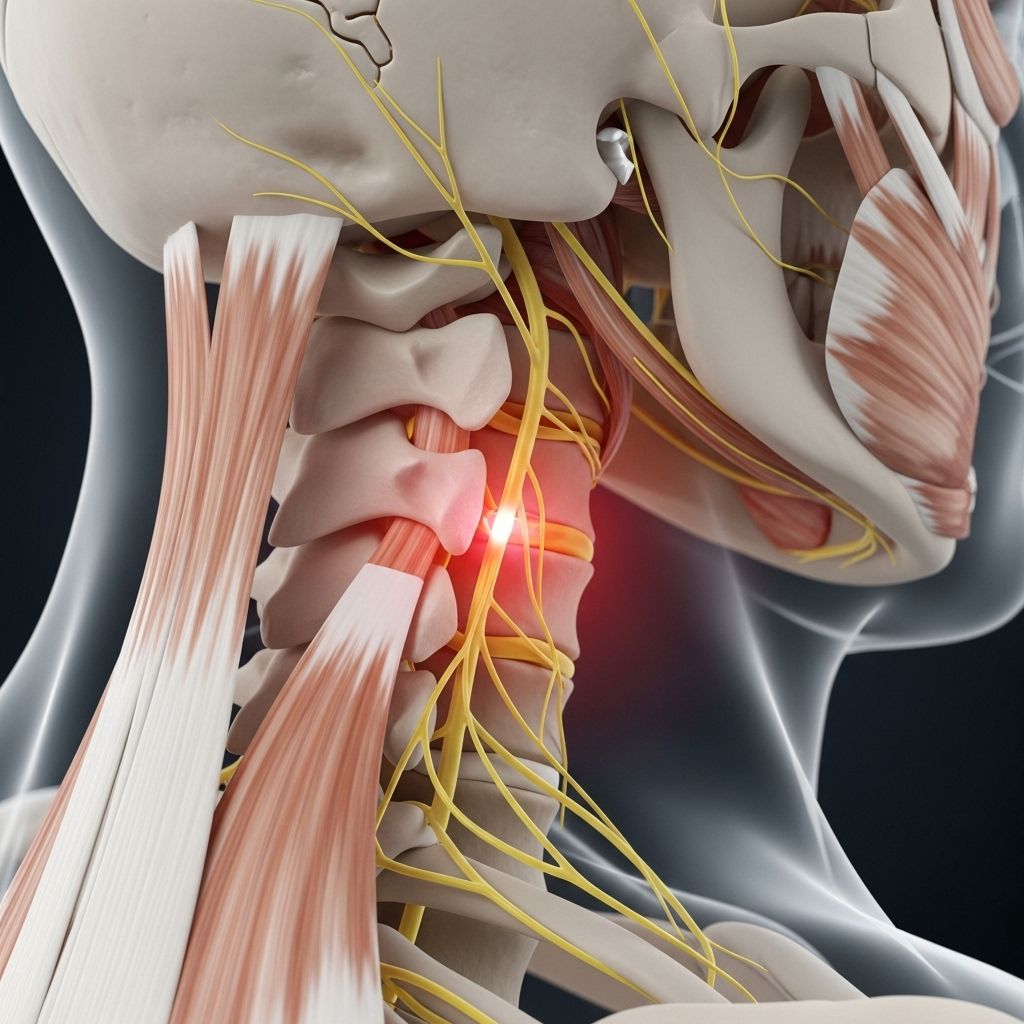How to Fix a Pinched Nerve in Your Neck: Comprehensive Relief Guide
Targeted self-care and expert advice help ease compression and improve spinal mobility.

A pinched nerve in the neck—medically referred to as cervical radiculopathy—can cause pain, numbness, tingling, and weakness not just in the neck but also the shoulders, arms, and hands. Understanding its origin, identifying symptoms, and adopting both home and professional treatments are vital for a speedy recovery and prevention of future problems.
Table of Contents
- Overview
- Causes of a Pinched Nerve in the Neck
- Symptoms and Warning Signs
- How Is A Pinched Nerve Diagnosed?
- Effective Treatments and Remedies
- Home Remedies for Pinched Nerve Relief
- Medical Treatments and When to See a Doctor
- Prevention Tips for Future Neck Health
- Frequently Asked Questions (FAQs)
Overview
A pinched nerve occurs when tissue such as bone, cartilage, or muscle compresses a nerve, impeding its function. In the neck, this often happens when a spinal nerve root is subjected to excessive pressure or physical constriction, resulting in radiating discomfort through the surrounding areas. Most cases are resolved with conservative care, but severe symptoms or persistent pain may require medical intervention.
Causes of a Pinched Nerve in the Neck
- Herniated Disk: The soft center of a spinal disk pushes out and presses on the nerve root.
- Spinal Stenosis: Narrowing of the spinal canal compresses the nerves.
- Degenerative Disc Disease: Age-related changes that shrink nerve exit pathways.
- Degenerative spinal changes account for 70% to 90% of all cases of pinched nerves in the neck.
- Bone Spurs: Excess bone growth can pinch nearby nerves.
- Injury or Trauma: Sudden impacts can displace vertebrae or create swelling that impinges on the nerve root.
- Poor Posture: Holding the neck in an awkward position (such as using a smartphone for prolonged periods) may contribute to nerve irritation.
- Other Tissue Pressures: Swollen muscles, tendons, or cartilage may create additional compression.
Symptoms and Warning Signs
Pinched nerve symptoms can vary in severity, location, and type. Common symptoms include:
- Numbness: Reduced sensation in the affected area.
- Pain: May be sharp, aching, or burning. It can radiate from the neck to the shoulder, arm, hand, or back.
- Tingling (‘pins and needles’): Most noticeable in hands or fingers.
- Muscle Weakness: Trouble with movement or grip strength.
- Feeling of ‘asleep’ limb: Particularly upon waking or after prolonged inactivity.
Symptoms often intensify when turning your head, coughing, or sneezing. They may also worsen at night.
When to Seek Medical Attention
- If symptoms last more than a few days and do not respond to rest or over-the-counter medication.
- If severe pain is continuous or leads to loss of mobility.
- If there are signs of significant muscle weakness, loss of bladder or bowel control, or sudden numbness in the limb—these are medical emergencies and require immediate care.
How Is A Pinched Nerve Diagnosed?
Diagnosis begins with a thorough medical history and physical examination. Key steps include:
- Symptom Assessment: Identifying pain patterns and areas affected.
- Physical Tests: Checking for changes in sensation, strength, and reflexes.
- Differential Diagnosis: Distinguishing nerve pain from shoulder or musculoskeletal injuries. In cases of neck nerve irritation, putting your arm above your head often relieves pain—whereas shoulder impingements cause discomfort with overhead activity.
- Imaging: X-rays to assess arthritis or structural changes, and MRI to confirm nerve compression in the neck.
Effective Treatments and Remedies
Relief from a pinched nerve typically begins with non-surgical, conservative methods. The following approaches are recommended, progressing from least to most intensive:
Conservative Self-Care and Lifestyle Changes
- Rest: Temporarily halt activities that trigger symptoms. Avoid strenuous neck movements.
- Cervical Collar: In some cases, a soft collar supports the neck and limits motion to allow the nerve to heal; use under medical supervision.
- Sleeping Adjustments: Use a cervical pillow to maintain neutral neck alignment at night.
- Ergonomic Modifications: Correct posture at desks and during device use can reduce strain.
Home Remedies for Pinched Nerve Relief
- Over-the-Counter Pain Relievers: Medications such as acetaminophen, ibuprofen, or naproxen can reduce pain and inflammation.
- Ice and Heat Therapy: Applying an ice pack (15–20 minutes every few hours) followed by gentle heat may ease swelling and relax muscles.
- Gentle Stretching: Slow, supervised stretches help release pressure on the nerve. Never stretch into pain.
- Modified Activities: Refrain from heavy lifting, repetitive motions, or awkward neck positions.
- Hydration and Rest: Supporting overall health can help tissue recovery.
Physical Therapy
A physical therapist can develop a targeted plan including:
- Stretching: Gentle stretches to increase flexibility and reduce nerve compression.
- Strengthening Exercises: Building support muscles (neck, shoulders, upper back) can ease pressure on nerves.
- Postural Training: Techniques to maintain healthy spinal alignment at work and home.
- Manual Therapy: Hands-on techniques to restore motion and improve neck mobility.
Most people see improvement within days to weeks if therapy is initiated early.
Medical Treatments and When to See a Doctor
| Treatment | Description | When Used? |
|---|---|---|
| Anti-inflammatory medications | NSAIDs and steroids to reduce swelling and relieve pain | For moderate pain; OTC and short-term prescription use |
| Oral corticosteroids | Short course to suppress pain and inflammation | When symptoms persist despite other treatments |
| Anticonvulsants & Antidepressants | Gabapentin, amitriptyline, duloxetine, nortriptyline for nerve pain | When conventional pain relievers aren’t sufficient |
| Epidural steroid injections | Glucocorticoids injected near the nerve root to decrease inflammation | For severe or unresponsive pain before considering surgery |
| Surgical intervention | Decompresses the nerve via removal of offending bone/disc tissue | Reserved for symptoms lasting >6–8 weeks, worsening movement, or signs of spinal cord compression |
Prevention Tips for Future Neck Health
- Maintain Good Posture: Keep your spine straight whether sitting, standing, or walking.
- Avoid Repetitive Strain: Take frequent breaks and use ergonomically designed workstations.
- Exercise Regularly: Strengthen support muscles with safe, low-impact activities.
- Weight Management: Excess weight increases spinal stress and risk of nerve compression.
- Stretch Before Activity: Warming up reduces the likelihood of acute injury.
- Monitor Sleeping Positions: Use appropriate pillows and avoid sleeping in awkward positions.
Frequently Asked Questions (FAQs)
What are the main symptoms of a pinched nerve in the neck?
Common symptoms include sharp neck pain, tingling, numbness in the arm, shoulder, or hand, muscle weakness, and burning discomfort. Symptoms often worsen with head movement, coughing, or sneezing.
How long does it take to recover from a pinched nerve?
Most people recover with rest and conservative care within days to a few weeks. Persistent or worsening symptoms may need more specialized treatment.
When should I see a doctor for a pinched nerve?
If pain does not improve after several days of self-care, if you experience muscle weakness, or if symptoms interfere with daily activities, consult a healthcare provider. Sudden, severe weakness or loss of bladder/bowel control are emergencies.
Does physical therapy help with pinched nerves?
Yes. Physical therapy can reduce pain, restore movement, and improve muscle strength without surgery.
What happens if you ignore a pinched nerve?
Prolonged compression may lead to lasting damage, including chronic pain, muscle weakness, or loss of function. Early intervention prevents most complications.
Is surgery ever needed for a pinched nerve in the neck?
Surgery is rare and only considered for severe, persistent cases after all conservative treatments have failed, or if neurological deficits develop.
References
- Harvard Health Publishing. Treating a Pinched Nerve.
- OrthoVirginia. How to Manage Pinched Nerves in the Neck.
- Mayo Clinic. Pinched Nerve—Symptoms and Causes.
- MyHealth Alberta. Pinched Nerve in the Neck: Care Instructions.
- Mayo Clinic. Pinched Nerve—Diagnosis and Treatment.
Takeaway
Pinched nerves in the neck are common but highly treatable. Early recognition, self-care, and medical guidance are vital for rapid recovery and restoration of function. With sustained healthy habits, you can reduce your risk of recurrence and enjoy lasting neck health.
References
- https://www.health.harvard.edu/pain/treating-a-pinched-nerve
- https://www.orthovirginia.com/blog/how-to-manage-pinched-nerves-in-the-neck/
- https://www.mayoclinic.org/diseases-conditions/pinched-nerve/symptoms-causes/syc-20354746
- https://myhealth.alberta.ca/Health/aftercareinformation/pages/conditions.aspx?hwid=abq3749
- https://www.mayoclinic.org/diseases-conditions/pinched-nerve/diagnosis-treatment/drc-20354751
- https://my.clevelandclinic.org/health/diseases/22639-cervical-radiculopathy-pinched-nerve
- https://my.clevelandclinic.org/health/diseases/6481-pinched-nerves
- https://orthoinfo.aaos.org/en/diseases–conditions/cervical-radiculopathy-pinched-nerve/
- https://www.youtube.com/watch?v=CqTPtMhtAwU
Read full bio of medha deb












